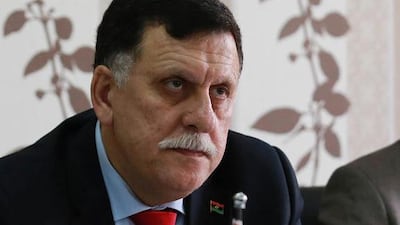A week after arriving in Tripoli, Libya’s new UN-backed unity government is already in trouble. Both existing rival governments in Libya have refused to accept it, leaving the country in chaos with three competing governments.
One week ago, the prime minister-designate of the UN-supported Government of National Accord, or GNA, Fayez Al Sarraj, arrived in the capital by naval patrol boat from Tunisia after local authorities shut down the air space to prevent his arrival.
He was accompanied by seven of his nine-strong presidential council, whose responsibilities include appointing government ministers.
Mr Al Sarraj quickly proclaimed an end to a 20-month-long civil war between Tripoli’s so-called National Salvation Government and the rival Tobruk-based elected House of Representatives parliament.
Before the formation of the GNA, the Tobruk government had been recognised by the international community as the country’s legitimate administration.
It convened in Tobruk in eastern Libya after the Libya Dawn militia alliance captured the capital of Tripoli in 2014 and established a rival parliament. Mr Al Sarraj, 56, a low-level politician and architect from Tripoli, is considered the perfect leadership candidate by the United Nations because he is not identified with either the Tripoli or Tobruk camp.
His appointment is the result of a year of peace talks, and the UN Security Council has now declared the GNA should be Libya’s only legitimate government, giving it theoretical control of more than US$100 billion (Dh367.2bn) in overseas assets.
On Tuesday, Mr Al Sarraj appeared to taste success when the Tripoli government, supported by some figures from the influential Muslim Brotherhood, declared itself dissolved, giving him control of the city’s powerful militias.
But on Wednesday, Tripoli prime minister Khalifa Ghweil announced a dramatic U-turn, declaring he would not hand power to Mr Al Sarraj, commanding militias and ministries to stay loyal to the Tripoli government.
“Given the requirements of public interest ... you are requested to continue your mission in accordance with the law,” Mr Ghweil said, threatening prosecution against officials who work with Mr Al Sarraj.
UN Libya envoy Martin Kobler admitted yesterday that Tripoli was now split. “We know of ministers [in the Tripoli government] who are willing to hand over” power to the GNA, he said. “But the ministers [who don’t want to hand over power] have to change, they have to peacefully hand over their power.”
Mr Al Sarraj has had no more success with the House of Representatives in Tobruk. Tobruk is still the internationally recognised parliament, until it votes to support the UN-backed government, which will see Mr Al Sarraj win all the important legitimacy status.
However, deputies are deeply divided, and five recent sessions have broken up without a vote.
The House of Representatives’ refusal to agree to the unity government plan also means that Libya’s powerful eastern army, under Gen Khalifa Haftar, remains loyal to the Tobruk parliament and not to Mr Al Sarraj.
Key institutions are equally divided. The Tripoli versions of the central bank and national oil corporation have joined Mr Al Sarraj. But their corresponding rival bodies in eastern Libya, home to the bulk of the country’s oilfields, this week announced their loyalty to the Tobruk parliament.
Deepening the confusion, the Tripoli parliament has also split. More than 70 members have agreed to form the so-called State Council – which, according to a UN-brokered peace plan, will act as an advisory body to Mr Al Sarraj – only for this parliament’s leader, Nuri Abu Sahmain, and other loyalists to reject it.
One sign of progress for Mr Al Sarraj was that the GNA took over the website of Tripoli administration early yesterday.
But the bewildering fragmentation of governments and institutions threatens to deepen the country’s chaos, with war having crushed the economy leaving 500,000 of the six million population homeless.
For the UN, the U-turn by the Tripoli government is a heavy blow. Foreign powers are anxious to end Libya’s civil war, so that a new united army can combat ISIL, which has grown rapidly amid the chaos.
Italy has offered to send 3,000 troops to train a united Libyan army, while the United States, France and Britain are reported to have special forces in the country, ready to coordinate air strikes against ISIL targets.
But for all this to happen, Mr Al Sarraj must impose his authority, and, for the moment, that is not happening.
Earlier this week, both the UAE and Russia warned that, while they welcomed Mr Al Sarraj’s arrival in Tripoli, his leadership is not legitimate without the agreement of the Tobruk parliament.
UAE state news agency Wam said that while the Emirates “welcomed the arrival of the president of the Presidential Council” as a “positive step”, the Libyan Political Agreement – the UN-brokered peace plan negotiated last year in Morocco – must be respected.
The European Union last week announced sanctions against the president of the Tobruk parliament, Agila Saleh, together with Mr Ghweil and Mr Abu Sahmain, as punishment for their opposition to the GNA. All three denounced the move, however, saying they would not bend to foreign pressure.
With Mr Al Sarraj marooned at the Tripoli naval base and the city still under the control of militias loyal to the Tripoli government, the UN has begun a new round of diplomacy.
On Wednesday, UN envoy Mr Kobler met Libyan leaders in Turkey and Tunisia in a bid to win acceptance for Mr Al Sarraj’s government.
But the UN’s problem is that persuading either Tripoli or Tobruk to cooperate with Mr Al Sarraj may simply harden opposition to the GNA. Diplomats, meanwhile, worry that the longer the delay, the worse Libya’s chaos will become, and the stronger ISIL will grow.
foreign.desk@thenational.ae

